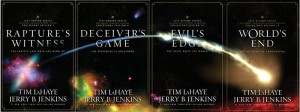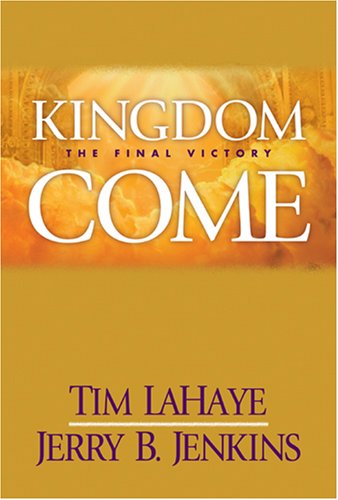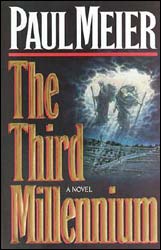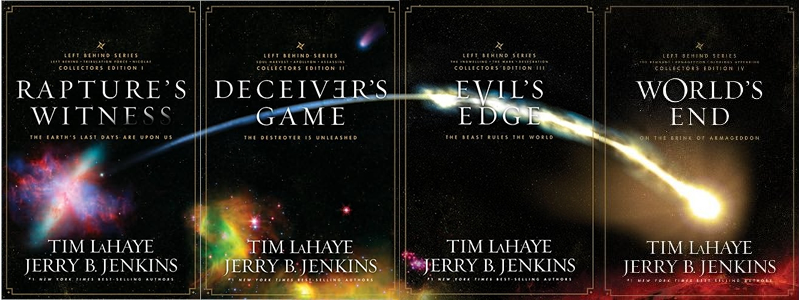Learning From Bad Books, Part 5
Why do the new versions of the Left Behind books have covers looking like science fiction?
On Sunday while my wife was shopping, I wandered next door to a Christian bookstore (yes, it’s the kind of Christian bookstore that’s open Sunday afternoons). Inside, I found a few surprises.
First, many books in the nonfiction section made the doctrine-wonk side of me very happy.
Second, in the fiction section, I found more fantasy books than I might have expected. (Has anyone else noticed the same? Or would you need to actually visit such a bookstore to check?)
Third — they’ve redone the Left Behind series. For every three books in the 12-volume end-times franchise, Tyndale has released a compilation, each with shorter, likely less memorable titles like Evil’s Edge. So instead of 12 wide-margins-with-largeish-text books, you get four paperbacks.
 And yes, they made them look like sci-fi-esque. Line up all four books and you see the cool glowing comet in outer space swoosh all the way across the covers from book 1 to 4.
And yes, they made them look like sci-fi-esque. Line up all four books and you see the cool glowing comet in outer space swoosh all the way across the covers from book 1 to 4.
Alas, ‘tis another case of the covers likely being cooler than the contents. Left Behind contained many supernatural and sci-fi elements, for sure, being set in a seven-year Tribulation during which technology advances, and God is revealing His wrath (but primarily mercy, the authors often hasten to explain) through horrific plagues. Yet often the authors seemed to rush through minor things such as meteor strikes and attacks from demonic locusts, to get to what seems to them to be the real action: planning a conference, or getting home before a woman has a baby.
Why skip the most interesting parts of the end times? Perhaps partly that was because of a sparse writing style: dialogue, not descriptions, seemed to be Jerry Jenkins’ forte. And still the series, for what it was, mostly worked. Other Christian end-times books — such as my frequent target The Third Millennium — make the Left Behind novels look like literary masterpieces.
But while TTM’s author chased after fantastic elements for their own sake, jumping genres and splashing unorganized fantasy glop all over, many of Left Behind’s fiction failures came from being so fearful of fantasy — even when Scripture is fantastic! — that the results became dull.
A boring ‘Kingdom’
In 2007 I wrote a three-part series for Spec-Faith, in which I guessed why Left Behind’s authors had shied away from the fantastic — even an especially awesome Biblical event:
Jenkins’ series dared not to speculate upon, at least to the extent that I would have, the weird and utterly incredible, seemingly indescribable, events that might occur upon Christ’s physical return to Earth. And why not? Probably because to do so — to picture the new things God might do at such a time that are not directly forecast in Scripture — would generate outrage among readers, who are convinced that the Left Behind series does, or should, only rarely speculate on future miracles that aren’t forecast in Scripture, and nothing further whatsoever.
 But Kingdom Come, the very last book (really) of the Left Behind series disregarded even the previous novels’ sparse attempts to include fantastic, sci-fi and supernatural elements.
But Kingdom Come, the very last book (really) of the Left Behind series disregarded even the previous novels’ sparse attempts to include fantastic, sci-fi and supernatural elements.
The storyline’s bulk is taken up with ripped-from-Scripture descriptions of the restored Temple […] and then a bunch of dialogue and goings-on within an absurdly acronymed children’s ministry, inordinate levels of attention given to the nation of Egypt’s bad attitude and the need for a name change, some romance here and there, and, perhaps worst of all, chapter-length accounts of Bible stories with no speculation at all beyond anything anyone could learn from the Bible itself.
Kingdom Come presented such a boring world, it may have even turned me to an opposite end-times view. (I hope it didn’t also turn some readers away from the real hope of the New Earth!)
In part 3 of that series, I suggested that a novel set on an Earthly kingdom under Christ’s rule …
calls for in-depth imagination and speculation — something Jenkins has not done. And it’s likely he could never do this anyway, given that, on the surface, such things seem insane and un-Biblical and many of the Left Behind series’ audience members would go mad. For certain people, perhaps, only a Cliffs-notes-style barebones summary of nearly exactly what the Bible says about the Millennium, no more, no less, will be accepted; and speculation beyond what Scripture has told us is forbidden. (This is partly why, in Kingdom Come, cameo appearances by saints such as Joshua and Noah result only in long, dull rehashes of anything you could have ever find out about them already in Sunday school.)
Biblical fidelity, while bending reality
So how to resolve either issue: chasing fantasy or miracles for their own sake, or being so skittish about them that even in descriptions of Christ’s return, one doesn’t dare to dream bigger?
 Here’s what I would say to TTM’s author Maier — well, actually I’d start with this: “Doctor, first, I’m sorry, I can’t help saying this, but remind yourself” (in the voice of DeForest Kelley) “Self, I’m a doctor, not a fantasy writer!” Then, assuming we’d covered that truth, I’d suggest: “Jesus Himself did miracles with a point. If He wasn’t flagrant with His supernatural displays for His public then, why would He start in the end-times? Shouldn’t our stories’ fantasy have a point?”
Here’s what I would say to TTM’s author Maier — well, actually I’d start with this: “Doctor, first, I’m sorry, I can’t help saying this, but remind yourself” (in the voice of DeForest Kelley) “Self, I’m a doctor, not a fantasy writer!” Then, assuming we’d covered that truth, I’d suggest: “Jesus Himself did miracles with a point. If He wasn’t flagrant with His supernatural displays for His public then, why would He start in the end-times? Shouldn’t our stories’ fantasy have a point?”
And to Jenkins I would suggest: “It’s okay to write fantasy. Read some Lord of the Rings or even Harry Potter to appreciate how other authors handle the fantastic. Blending real fantasy with the Christian concepts of a millennial Kingdom, especially with an epic war against Satan at the end, you could have done so much better. You may have kept it ‘safe,’ sticking to only what you believe the Bible says about the kingdom, but haven’t you missed the spirit? And maybe even not glorified God as much as you could, and not helped others long for the After-world?”
(Next week: bad Christian books get worse when they break real-world rules — Biblical truth.)




























Great article Stephen! There’s not a whole lot I can add. I agree with much of what you said, although I didn’t enjoy the Left Behind series nearly as much as you (and that’s okay). It’s a pity Tim La Haye had such a hand in the book, his presence is very obvious. His passages reek (yes, I said reeked) of sermonising padding. Finally, Kingdom Come was deathly dully and Jesus return was beyond frustrating. Jesus should be portrayed as the epitome of creativity, warmth, interest, strength, wrath truth – everything that is good and true but he just sounded like a cardboard cut-out version of himself. Not good. Thanks for sharing your knowledge with us all.
I stopped reading the LB series around book 6 or 7 (I can’t remember which one now). I have never been that interested in Revelation (my dad likes to say you can sum it up in two words: we win). I only read the first one because of a recommendation from a friend, and I remembered being surprised by how much I liked it and how well it was done. You have to understand: I’d never even heard about all this speculation on premillenial or postmillenial or rapture or anything. So this whole concept was rather creatively new to me, and I thought the storylines and characters were impressive in their sincerity, not to mention the political intrigue it involved. So I checked out the second book, and thought it was about as good as the first. Plus, I enjoyed more explorations on the subject of how the world was going and how our new trib force was working in it.
But after a while the very things that pulled me into the books dissapeared and were replaced by cheap storytelling tricks, complete disrespect for characters I liked, and rote plots that I could predict the endings for about two pages in. It literally got to the point that upon meeting a character I felt I could predict when and how he or she would die. I think the ravaging of Rayford Steele’s character is about as bad as how Peter Jackson treated Faramir in the “Two Towers” movie, and while in the first books Carpathia had frightened the mess out of me, several books in he not only ceased to be scary but also became rather boring. The intrigue quit being interesting and instead bordered on the absurd. I started feeling like I was being forcefed spiritual adventure that I didn’t even care about anymore. So I stopped reading. I just couldn’t bring myself to care about what happened. I never read the remaining books or “Kingdom Come,” though I always defened the first book or two as being good. I think it really amounted to franchise fatigue: I never read the things for fantasy or scifi, they didn’t really sell themselves that way. More political thriller mixed with horror. But it wasn’t the genre or lack of risk that turned me off (I thought some moves were rather gutsy, especially for characters who claimed to be Christians), but rather the devolution of quality.
[…] the True Light in such a way that it’s seen as “dumb” or “boring.” (E. Stephen Burnett wrote of one famous end-times novel that it “presented such a boring world, it may have even turned me to an opposite end-times […]
Stephen:On Sunday while my wife was shopping, I wandered next door to a Christian bookstore (yes, it’s the kind of Christian bookstore that’s open Sunday afternoons). Inside, I found a few surprises.
Which….narrows it down. 0=)
(Has anyone else noticed the same? Or would you need to actually visit such a bookstore to check?)
I have, but my memory serves mostly from the end times or “aliens turn out to be demons” variety. The YA section is chock full of fantasy.
Third — they’ve redone the Left Behind series. For every three books in the 12-volume end-times franchise, Tyndale has released a compilation, each with shorter, likely less memorable titles like Evil’s Edge. So instead of 12 wide-margins-with-largeish-text books, you get four paperbacks.
Good move, other than the rather lame titles. Four large books is less daunting to look at than twelve shorter ones. Given I read 11 of those things, it adds up.
And yes, they made them look like sci-fi-esque. Line up all four books and you see the cool glowing comet in outer space swoosh all the way across the covers from book 1 to 4.
Eh. The title would turn me off,to be honest, despite the new cover.
Left Behind contained many supernatural and sci-fi elements, for sure, being set in a seven-year Tribulation during which technology advances, and God is revealing His wrath (but primarily mercy, the authors often hasten to explain) through horrific plagues. Yet often the authors seemed to rush through minor things such as meteor strikes and attacks from demonic locusts, to get to what seems to them to be the real action: planning a conference, or getting home before a woman has a baby.
Well, but you have to admit, on the other hand, after awhile it’s too easy to become immune to the shock-and-awe of explosions and creepy demons. There was something creepier to me about televised beheadings with millions of viewers than the demon locusts.
Just don’t get me started on Hattie. Ugh and a half.
Why skip the most interesting parts of the end times? Perhaps partly that was because of a sparse writing style: dialogue, not descriptions, seemed to be Jerry Jenkins’ forte. And still the series, for what it was, mostly worked. Other Christian end-times books — such as my frequent target The Third Millennium — make the Left Behind novels look like literary masterpieces.
Eh, I think they started out more concerned with the characters and their reactions than the events themselves. I really, really wish Buck had used his actual name instead of Buck. Don’t ask why that bugged me.
In 2007 I wrote a three-part series for Spec-Faith, in which I guessed why Left Behind’s authors had shied away from the fantastic — even an especially awesome Biblical event:
Do I need to personally email you to see said 2007 entries? 0=)
Jenkins’ series dared not to speculate upon, at least to the extent that I would have, the weird and utterly incredible, seemingly indescribable, events that might occur upon Christ’s physical return to Earth. And why not? Probably because to do so — to picture the new things God might do at such a time that are not directly forecast in Scripture — would generate outrage among readers, who are convinced that the Left Behind series does, or should, only rarely speculate on future miracles that aren’t forecast in Scripture, and nothing further whatsoever.
Eh, it’s almost a staple of the genre. Back in Jesus’ day, everyone was so convinced they knew how the Messiah was going to come that they could not fathom he was standing right in front of him, and a good many of those who did actually see it kept their mouths shut for fear (see Gospel of John…chapter something). Similarily, I think the real chain on the genre as a whole is that we have the same assumption on Revelation, to the point that it’s really hard to even fathom anything outside what everyone anticipates.
I’m personally of the persuasion we’re all dead wrong. But that’s me.
But Kingdom Come, the very last book (really) of the Left Behind series disregarded even the previous novels’ sparse attempts to include fantastic, sci-fi and supernatural elements.
Yeah…I was afraid of that.
of the restored Temple […]
Which is…odd.
and then a bunch of dialogue and goings-on within an absurdly acronymed children’s ministry, inordinate levels of attention given to the nation of Egypt’s bad attitude and the need for a name change, some romance here and there, and, perhaps worst of all, chapter-length accounts of Bible stories with no speculation at all beyond anything anyone could learn from the Bible itself.
You’re kidding.
I’ve got the whole heavenly host worried about my arrival. I’m seriously commandeering an angel for an inter-galactic flight. 0=)
Kingdom Come presented such a boring world, it may have even turned me to an opposite end-times view. (I hope it didn’t also turn some readers away from the real hope of the New Earth!)
Again, I think that comes honestly enough from some old, old presuppositions that I think only more recently the church has begun to tackle. Angels playing harps just doesn’t appeal to most people. It’s a bit sad how often I have to explain Heaven’s more like a wedding reception, a homecoming, and a victory celebration rolled into one: the godfather of parties that never ends – and you have no real concept of time, so you don’t notice or get tired of it.
So how to resolve either issue: chasing fantasy or miracles for their own sake, or being so skittish about them that even in descriptions of Christ’s return, one doesn’t dare to dream bigger?
I think that says more about the writer than the book. Personally. No rudeness intended. But if my tendency is to pull my punches as a writer, that’s on me.
Christian: Finally, Kingdom Come was deathly dully and Jesus return was beyond frustrating. Jesus should be portrayed as the epitome of creativity, warmth, interest, strength, wrath truth – everything that is good and true but he just sounded like a cardboard cut-out version of himself. Not good.
Yeah, the more I hear, the more I’m glad I stopped after Armageddon. I just honestly read the last page, understood they were trying to hide which character survived (Buck or Rayford), and after rereading a couple times, didn’t think either could have, legitimately.
Michelle:You have to understand: I’d never even heard about all this speculation on premillenial or postmillenial or rapture or anything.
Well, while I might argue that there really is more to be gleaned from it besides “we win,” I do agree it’s way too easy to develop a fetish and an unhealthy obsession with it. So…really…read it for what it’s worth, but don’t kill yourself trying to grasp every detail of the visions. There’s plenty that’s clear outside the frustrations.
Per the rest – Well said. I got tired of them killing off characters I really had grown to like or forcing characters to do something quite out of character and absurd just so they could off her (::cough::Chloe::cough::).
[…] week, during the same bookstore visit I mentioned before, I found that book and tried a version of Bible roulette. You know, flip to a random page (122) and […]